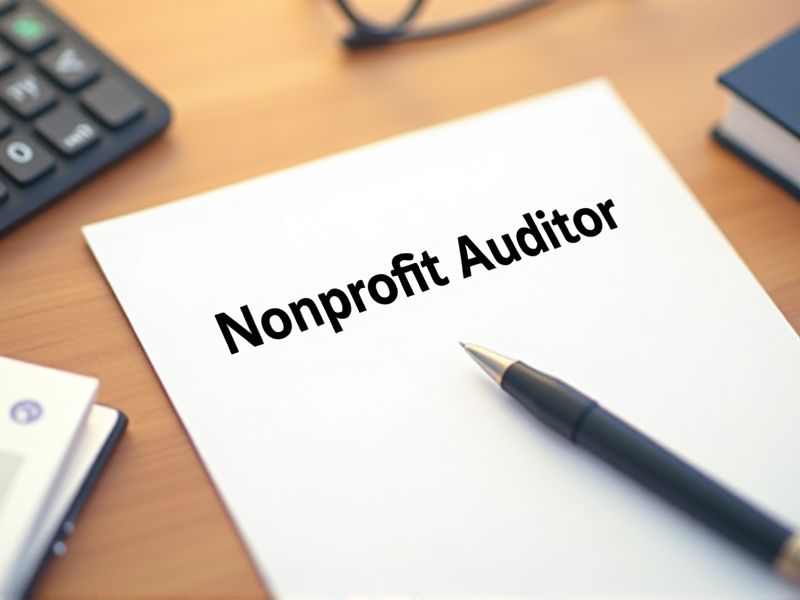
Nonprofit auditors operate in a specialized financial landscape requiring adherence to distinct regulations and practices. Certifications demonstrate a thorough understanding of nonprofit accounting standards and increase credibility among stakeholders. They also ensure compliance with legal and ethical guidelines, thereby minimizing risks associated with financial reporting. Here are some important certifications you may need to become a Nonprofit Auditor.
Certified Public Accountant (CPA)
Nonprofit organizations must adhere to specific financial regulations, and a Certified Public Accountant (CPA) ensures compliance with these standards. Complex accounting tasks, like grant management and fund accounting, are better managed by CPAs due to their specialized training. Regulatory bodies often require audited financial statements, and a CPA provides the necessary credibility and assurance. When a CPA conducts an audit, it can enhance the organization's transparency and donor confidence.
Certified Nonprofit Accounting Professional (CNAP)
Certified Nonprofit Accounting Professional (CNAP) provides specialized knowledge in nonprofit financial management standards, essential for accurate auditing in the sector. Nonprofit organizations often follow different accounting rules and reporting requirements compared to for-profit entities, making CNAP essential for auditors to understand these nuances. CNAP equips auditors with the skills to ensure compliance with regulatory standards, reducing the risk of financial misstatements and penalties for nonprofits. The certification signals a commitment to understanding and addressing unique nonprofit challenges, thereby enhancing trust with stakeholders and donors.
Certified Internal Auditor (CIA)
A Certified Internal Auditor (CIA) brings a verified level of expertise, ensuring that a nonprofit's financial practices align with legal and ethical standards. This certification enhances the credibility of financial reports, which is crucial for maintaining trust with donors and stakeholders. Having a CIA on board aids in identifying and mitigating risks within the nonprofit's financial operations. With their specialized knowledge, CIAs provide valuable insights for improving internal controls and governance practices within the organization.
Certified Government Financial Manager (CGFM)
Certified Government Financial Manager (CGFM) credentials bring specialized knowledge in government financial management, which ensures that nonprofit auditors are well-versed in the unique financial regulations and standards applicable to governmental and nonprofit entities. This expertise enhances the auditor's ability to identify and address potential compliance issues in nonprofit financial operations. CGFM certification strengthens the credibility of auditors by validating their proficiency in areas such as internal controls and funding accountability, instilling greater confidence among stakeholders. Nonprofit organizations benefit from employing CGFMs as auditors, as their enhanced skill set contributes to more thorough and accurate financial evaluations.
Certified Fraud Examiner (CFE)
Nonprofit organizations often handle significant funds and donations, leading to potential financial discrepancies or mismanagement. A Certified Fraud Examiner (CFE) has specialized skills in identifying and preventing fraud, which ensures the integrity of financial reporting. CFEs bring a keen understanding of risk factors and internal controls, crucial for maintaining donor trust and transparency. Their expertise aids in safeguarding the organization's assets and upholding its mission.
Certified Management Accountant (CMA)
Nonprofit organizations operate under strict financial regulations, and a Certified Management Accountant (CMA) ensures that auditors possess the necessary financial expertise and strategic insight. The CMA credential equips auditors with advanced skills in budgeting, cost management, and internal controls, crucial for maintaining transparency and accountability in nonprofits. Nonprofit entities often face complex financial reporting requirements; a CMA helps auditors navigate these complexities efficiently. Hiring an auditor with CMA certification can enhance stakeholder trust by demonstrating a commitment to financial integrity and effective governance.
Chartered Global Management Accountant (CGMA)
Nonprofit organizations often require rigorous financial oversight to maintain donor trust and the CGMA designation signals that an auditor has specialized skills in management and financial accounting. This credential enhances an auditor's ability to analyze complex financial situations, crucial for nonprofits that must justify their spending to stakeholders. A CGMA-certified auditor can help streamline budgeting processes by applying advanced strategic management principles. Their expertise in risk management also aids in ensuring compliance with regulatory requirements, reducing potential legal and financial liabilities for nonprofits.
Certified Information Systems Auditor (CISA)
Nonprofit auditors require the Certified Information Systems Auditor (CISA) certification to effectively assess and ensure the security and integrity of financial information systems. CISA certification equips auditors with expertise in IT governance, enabling them to identify vulnerabilities and compliance issues within a nonprofit's digital infrastructure. Nonprofits increasingly rely on complex IT systems for operations, and possessing CISA credentials allows auditors to evaluate these systems' effectiveness and impact accurately. CISA-certified auditors bring credibility and standardized skills, enhancing trust and transparency in nonprofit financial evaluations.
Certified Nonprofit Professional (CNP)
Certified Nonprofit Professional (CNP) training provides an in-depth understanding of nonprofit operations and enhances an auditor's ability to assess financial practices specific to this sector. Expertise gained through CNP certification better equips auditors to identify potential compliance and financial reporting issues unique to nonprofit organizations. Having a CNP allows auditors to communicate more effectively with nonprofit management, leading to more accurate and insightful audits. The specialized knowledge from CNP certification enables auditors to offer tailored recommendations that can improve fiscal management and operational efficiency in nonprofits.
Project Management Professional (PMP)
Nonprofit auditors often face complex project management challenges, and having a PMP certification can enhance their ability to organize and execute audits effectively. The structured methodology from PMP helps in managing multiple stakeholders and resources efficiently, reducing the risk of oversight. Data shows that PMP-certified professionals report higher levels of project success, which is crucial in maintaining donor trust and transparency. Moreover, the certification provides auditors with a toolkit for handling unexpected issues, thereby improving overall audit quality and reliability.
Summary
When you hire a certified nonprofit auditor, you can expect an enhancement in the credibility and transparency of your financial statements. This certification ensures the auditor has specialized knowledge in nonprofit regulations, increasing compliance and accuracy. Their expertise often leads to improved financial reporting and better risk management for your organization. Stakeholders and donors may gain increased confidence, potentially leading to greater funding opportunities.
